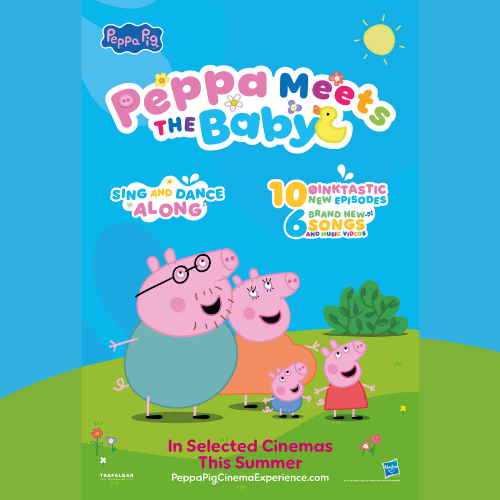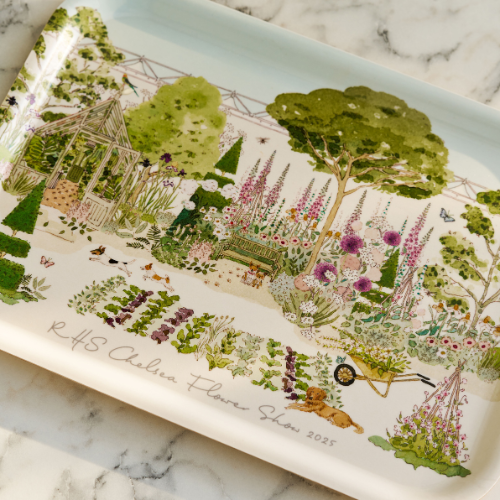Start Licensing’s Ian Downes takes a look at some of the trends and activities in the retail sector that are a cause for optimism.
One challenge that we are all facing in licensing at the moment is retailing. Many retailers have announced cutbacks, closures and redundancies.
This week Thorntons announced the closure of its physical stores. It has been a long-term supporter of licensing, running programmes with properties like The Snowman very successfully in recent years. Clearly for a business like licensing that is heavily reliant on retail this has to be a concern.
Against this backdrop, it is interesting to see some of the trends and activities in the retail sector that might be a cause for optimism. Of course, one big positive trend seems to be the growth in ecommerce and the way that a number of licensing companies have adapted their businesses to tap into the move to home shopping.
Value retail has become increasingly important for licensing and retailers such as Poundland, Home Bargains and B&M have embraced licensing over the years. For certain brands and licensees value retailing has become a core part of their retail activity.
I popped into my local Poundland to take a look at its current offer licensing-wise. Like always, shopping in-store is a different experience these days. There is less time to dwell and like a lot of retailers Poundland has introduced a designated route to take as you shop. This means my Looking Out is a little bit more hurried than it used to be. My overall impression was that Poundland is currently featuring less licensed lines than it was say 12 months ago.
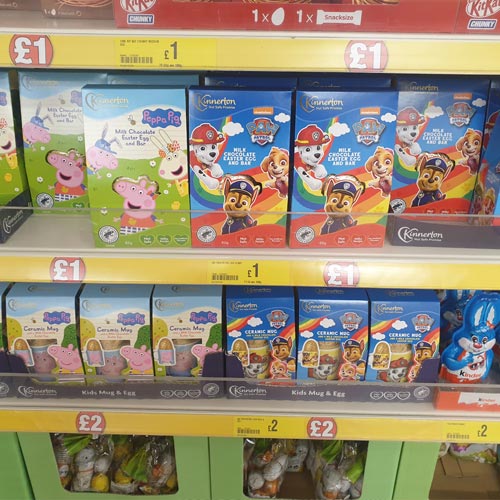
Products that were in-store at Poundland included a good range of licensed Easter eggs from Kinnerton. The range featured Peppa Pig and PAW Patrol. Interestingly there were £1 eggs and £2 eggs (including a mug) – this reveals one of the challenges Poundland has faced, namely sticking with a single price. I think it has had to evolve the price offer as market dynamics have changed.
Poundland is good at utilising all available space in-store and makes frequent use of clipstrips to present specific offers. Licensed ranges tend to feature in this context. I spotted a range of Disney Princess bath fizzers on a clipstrip. This sales technique seems to work well in the context of Poundland.
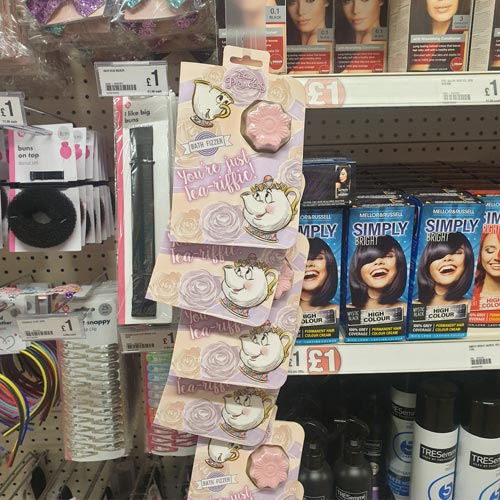
Poundland was also selling the Carex Fun Edition bath and shower gel range that features Swizzels confectionery brands such as Drumstick Squashies and Love Hearts.
This category in toiletries has undergone a lot of changes in terms of the scents and themes used for products – I remember we had a lot of success with Tango shower gels in the value retail category some years ago and there was quite a lot of head scratching about using a brand like Tango in the category. Today it seems the norm to have these kind of fragrances available.
The value retailers seem more willing to support new ideas and product themes. I think this is because it is in their interest to offer something new to their consumers and also feature new products to encourage repeat visits. In this context, licensing can help value retailers move more quickly and offer unique products.
Other brands featured in the toiletries aisle include Toy Story for bath crystals, L.O.L. travel toothbrush kit and Disney’s Oral B Kids toothpaste range.
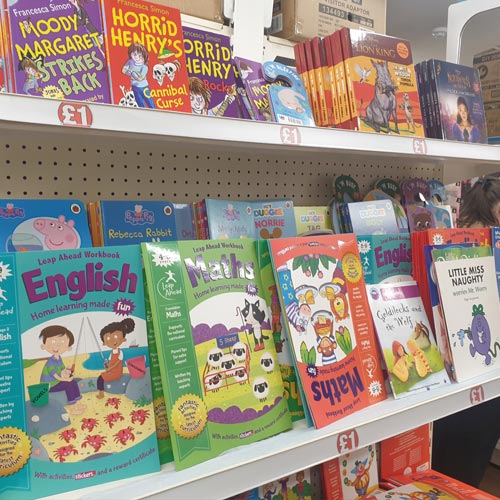
Poundland also has a strong offering of books including children’s books. There were a number of licensed books on offer including The Lion King and Hey Duggee. There were also some well known literary characters featured such as Horrid Henry. I suspect publishers are now more willing to develop formats for the value retailers and see this as opportunity of selling in volume. Retailers like Poundland give publishers access to consumers that maybe they can’t reach elsewhere.
Also books for £1 are great gifts for occasions like children’s parties. I suspect shoppers are increasingly savvy about where to shop when they are looking for specific products for specific occasions.
Similarly Poundland has a strong greetings card offering that features licensed cards such as Harry Potter and PAW Patrol. I also spotted some Thorntons products in-store which are licensed I believe – specifically Chocolate Wafer Rolls. Moving forward, and given the decision to close stores, I believe Thorntons will be looking to drive more sales through other retailers and I suspect that it will look to develop more licensing partnerships as well.
Another dynamic in retail at the moment seems to be retailers hosting other retailers and retail brands. I spotted that Sainsbury’s now has Habitat products and themed areas in its stores. I understand that Sainsbury’s owns the Habitat brand and have had mini Habitat stores for a while, but it seems it is ramping this up a bit further. It will be interesting to see if Sainsbury’s looks to licence the Habitat brand at all outside of Sainsbury’s and Argos. Or maybe invite licensees to work with them in-store.
John Lewis has also announced it plans to have mini stores in Waitrose stores. I suspect we will see more examples of retailers featuring other retail brands under their roof – I think post lockdown cooperation and collaboration will be to the fore as retailers seek ways of engaging with consumers and remaining competitive.
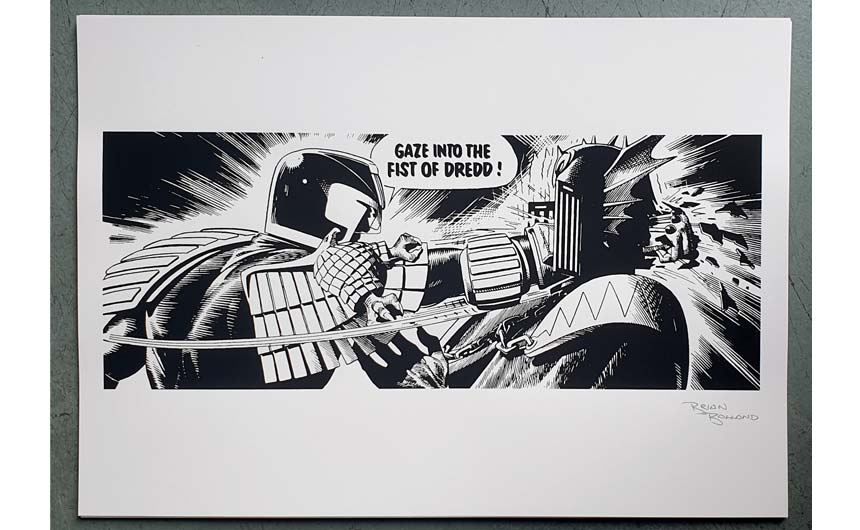
Creative thinking and development in retail hasn’t been confined to supermarkets. GOSH Comics – a specialist comic store located in Soho – has long been a hub for comic fans and collectors. The product offering is focused on comics and graphic novels, but it has taken in other products such as collectable toys. In normal times, it is also a destination store for signings and events in the comic community.
Given the current situation it has been looking at new opportunities. It has had some success previously with selling art prints and against this backdrop it has recently developed an exclusive Judge Dredd art print with artist Brian Bolland and Rebellion, the owner of Judge Dredd.
This is a great example of a retailer knowing their customer base and what they are interested in. GOSH Comics has created an offer it knows that customers will like and has developed it with great knowledge of the brand. This shows how specialist retailers can play a role in licensing and help develop authentic products for the fan community. I think this speciality retail channel offers a lot more potential for licensing, but will require specific management to nurture it further. This is an example of one size shouldn’t fit all in licensing.
Another trend in retail is the use of celebrities and designers to create exclusive collections for retailers. Part of the motivation for this seems to be to achieve a competitive edge and to create good content for social media. The latter point is quite significant as it seems retailers have to look at a mixed media approach when it comes to marketing themselves and their ranges. Using platforms like Instagram to help sell is going to be more and more important. Well known designers and celebrities can help boost a retailers’ efforts in this area. That said traditional media still has a role to play.
I spotted a loose insert in one of my Sunday papers this week for mail order company Freemans. It has launched an exclusive range with designer Julien Macdonald. The range – which is called Star by Julien Macdonald – features bright and bold colourways. It centres on apparel but also extends into homewares and furniture. There are well over 200 products in the collection.

As well as loose inserts the range is being promoted on TV, through digital media and PR. The promotion for the range features Janette Manrara, who was Julien’s Strictly dance partner. Reading the quotes in the Freemans’ press release about the range it seems one key motivation behind the partnership is that Freemans is hoping that the Star range will help re-connect it with younger consumers and help re-establish its fashion credentials. It mentioned it has a number of other partnerships in the range, but clearly this one is seen as a really important one that it is backing to succeed.
I expect to see more shifts and changes in the retail landscape over the coming weeks, but have been encouraged to see that licensing has a role to play in the re-shaping of retail. I think we will need to embrace change and be more flexible in the way we work.
I think this also includes retailers – hopefully retailers will recognise that licensing can really help them compete, attract customers and offer a point of difference.
Ian Downes runs Start Licensing, an independent brand licensing agency. His Twitter handle is @startlicensing – he would welcome your suggestions for what to look out for.

















